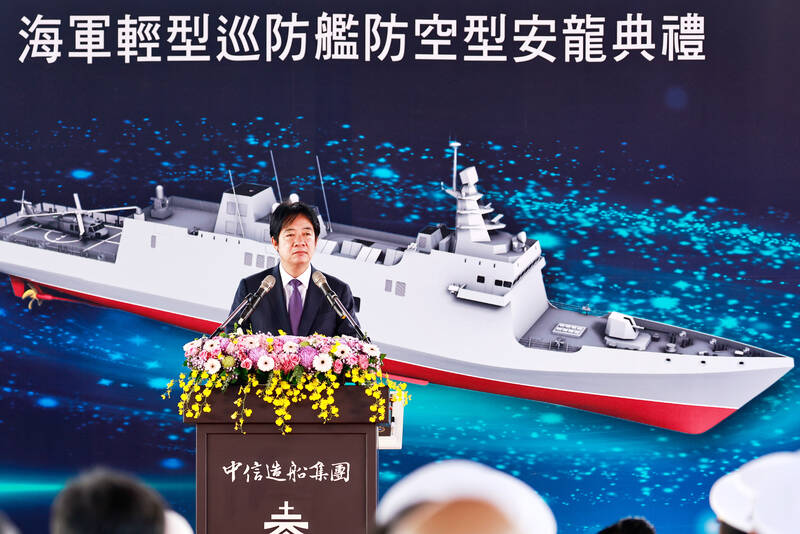President William Lai (賴清德) praised the progress made in Taiwan’s ongoing domestic shipbuilding project, while presiding over a keel-laying ceremony for a domestically built light frigate prototype in Kaohsiung yesterday.
Speaking at Jong Shyn Shipbuilding Co (中信造船), Lai said it took the company about a year to reach the second phase of constructing the 2,500-tonne light frigate prototype.
In November last year, then-president Tsai Ing-wen (蔡英文) presided over a commencement ceremony for the anti-air light frigate prototype, Lai said.

Photo: Daniel Ceng, EPA-EFE
Yesterday marked a major milestone in the nation’s indigenous ship and aircraft construction project, Lai said.
The project, initiated during Tsai’s administration, exemplifies Taiwan’s determination to defend itself while boosting the local defense industry’s development, he added.
The prototype is the first navy vessel classified as a “Tier 2,” or second class, combat ship, he said.
Once it enters service, the vessel would be equipped with domestically built anti-ship and anti-air missiles developed by the Chungshan Institute of Science and Technology, the military’s top research unit, and would be responsible for patrolling seas around the nation, he said.
Laying the keel is one of several celebrated events in the life of a ship, signifying the beginning of the vessel’s construction.
Other ceremonies include launching, commissioning and decommissioning.
The anti-air light frigate prototype is one of two being built by the Kaohsiung-based Jong Shyn.
The other one is an anti-submarine prototype. Both are scheduled to be delivered to the navy by October 2026.
The navy said the vessels would patrol the Taiwan Strait, respond to situations in the “gray zone,” conduct reconnaissance and surveillance missions, escort transport ships and supplies to remote islands, secure sea lines of communication, and support training and exercises.
“Gray zone” tactics are generally defined as coercive actions that are below the threshold of war.
They can refer to Chinese aircraft flying maneuvers near Taiwan or China’s use of fishing fleets to stake out waters.

A magnitude 7.0 earthquake struck off Yilan at 11:05pm yesterday, the Central Weather Administration (CWA) said. The epicenter was located at sea, about 32.3km east of Yilan County Hall, at a depth of 72.8km, CWA data showed There were no immediate reports of damage. The intensity of the quake, which gauges the actual effect of a seismic event, measured 4 in Yilan County area on Taiwan’s seven-tier intensity scale, the data showed. It measured 4 in other parts of eastern, northern and central Taiwan as well as Tainan, and 3 in Kaohsiung and Pingtung County, and 2 in Lienchiang and Penghu counties and 1

A car bomb killed a senior Russian general in southern Moscow yesterday morning, the latest high-profile army figure to be blown up in a blast that came just hours after Russian and Ukrainian delegates held separate talks in Miami on a plan to end the war. Kyiv has not commented on the incident, but Russian investigators said they were probing whether the blast was “linked” to “Ukrainian special forces.” The attack was similar to other assassinations of generals and pro-war figures that have either been claimed, or are widely believed to have been orchestrated, by Ukraine. Russian Lieutenant General Fanil Sarvarov, 56, head

FOREIGN INTERFERENCE: Beijing would likely intensify public opinion warfare in next year’s local elections to prevent Lai from getting re-elected, the ‘Yomiuri Shimbun’ said Internal documents from a Chinese artificial intelligence (AI) company indicated that China has been using the technology to intervene in foreign elections, including propaganda targeting Taiwan’s local elections next year and presidential elections in 2028, a Japanese newspaper reported yesterday. The Institute of National Security of Vanderbilt University obtained nearly 400 pages of documents from GoLaxy, a company with ties to the Chinese government, and found evidence that it had apparently deployed sophisticated, AI-driven propaganda campaigns in Hong Kong and Taiwan to shape public opinion, the Yomiuri Shimbun reported. GoLaxy provides insights, situation analysis and public opinion-shaping technology by conducting network surveillance

‘POLITICAL GAME’: DPP lawmakers said the motion would not meet the legislative threshold needed, and accused the KMT and the TPP of trivializing the Constitution The Legislative Yuan yesterday approved a motion to initiate impeachment proceedings against President William Lai (賴清德), saying he had undermined Taiwan’s constitutional order and democracy. The motion was approved 61-50 by lawmakers from the main opposition Chinese Nationalist Party (KMT) and the smaller Taiwan People’s Party (TPP), who together hold a legislative majority. Under the motion, a roll call vote for impeachment would be held on May 19 next year, after various hearings are held and Lai is given the chance to defend himself. The move came after Lai on Monday last week did not promulgate an amendment passed by the legislature that